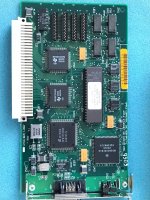IIfx
Well-known member
There are a bunch of Apple Ethernet NB nubus cards on eBay right now, some of them sealed in box. The card has it's own on board 68000 CPU which runs a dedicated networking OS to offload network traffic processing off of the host Macintosh. Apple claims this architecture results in overall increased system performance when performing networking tasks.
Other than the 68000, some RAM, and the OS ROM the board seems to use the same Ethernet controller as found in a typical Quadra, the "SONIC" chip.
If the card actually delivers some performance boost due to it's accelerated nature I will probably go ahead and buy one to put in my IIfx. My goal is to have as many co-processors as possible in that machine and it's looking like I may be able to have a DSP or co-processor in every NuBus slot.
Is it possible to win an award for "most overly accelerated 68030 based Macintosh"? [8D]
Other than the 68000, some RAM, and the OS ROM the board seems to use the same Ethernet controller as found in a typical Quadra, the "SONIC" chip.
If the card actually delivers some performance boost due to it's accelerated nature I will probably go ahead and buy one to put in my IIfx. My goal is to have as many co-processors as possible in that machine and it's looking like I may be able to have a DSP or co-processor in every NuBus slot.
Is it possible to win an award for "most overly accelerated 68030 based Macintosh"? [8D]

